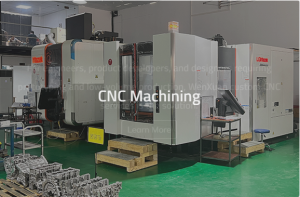CNC machining is thus an essential resolution introduced to answer the numerous problems faced by industries nowadays. This technology has the ability to elevates precision, efficiency and versatility in applications from aerospace to medical devices. Read on to learn more about how this works and what the different solutions to certain manufacturing problems of CNC machining are.
Unprecedented Accuracy & Consistency
Achieve High Accuracy
CNC machining is attainable with exceptional precision, often with a tolerance of ±0.005 inches or less. This level of accuracy is important for industries where tiny differences can have catastrophic failure consequences, like in aerospace or microelectronics. CNC machines can produce high-quality parts with high precision from one part to the next, so components can be designed to fit well together in complex assemblies without needing to be further tailored.
Ensure Consistent Quality
CNC machines are much less repeatable than manual methods. After a part becomes programmed, a CNC machine can create hundreds or thousands of exact copies of the part with no variance between them anywhere on the machine. This consistency is crucial in ensuring quality standards in mass production processes, especially for the manufacturing of critical components in automotive or healthcare.
Agility and rapid prototyping -
Rapid Production Turnaround
Pros: Makes prototyping much faster via CNC machining; While traditional prototyping methods can take a matter of weeks, CNC machines can provide up accurate and complex parts in hours or days. It allows companies to iterate designs quickly, and shrink the time it takes for new products to get to market. CNC machining has the flexibility to adapt to changes in the market and customer feedback quickly.
Versatility Across Materials
The fact that the CNCs of today work with a variety of materials from metals, plastics, etc. This material versatility enables manufacturers to validate prototypes in the same material as the final part, leading to more accurate performance tests and quality control before high-volume manufacturing.
Cost Efficiency in Production
Use Materials Wisely And Cut The Waste
CNC machining minimizes waste because it accurately cuts the material to the exact specifications. CNC machining is the process of removing material from a solid block, rather than adding it layer by layer as with additive manufacturing, which makes it more efficient in regards to material usage, subsequently reducing expenses. For expensive materials such as titanium or high-grade alloys, less wastage means we are saving a lot of expense.

Lower Labor Costs
CNC machining takes less man power when compared to traditional methods of manufacturing. Machines can be programmed and structured to work unattended within little supervision. This reduction in labor not only lowers costs but also reduces the risk of human error, which ultimately improves the efficiency of the manufacturing process.
Improved Safety and Reduced Downtime
Improve Workplace Safety
CNC machines are automated, thereby providing an added safety element in manufacturing facilities. Cutting tools are dangerous, and this automation removes the necessity for operators to be hands on with cutting tools. Fewer injuries mean fewer costs - medical costs and lost labor hours - from workplace injuries.
Minimize Machine Downtime
CNC machines tend to be hardy and are designed to run all day without changing the output. Preventative maintenance scheduled and real-time monitoring software can help by preventing some problems at the source and removing the potential for downtime.
This industrial problem is accurately solved, efficient and elastic by CNC machining, which is a vital instrument for contemporary manufacturing sectors. If you would like more information on how CNC machining can help streamline your manufacturing process, check out CNC Machining Solutions. As this technology is a platform for enabling more agile, less costly and highly yielding manufacturing it is considered a foundation in the move to grow production in the process.
